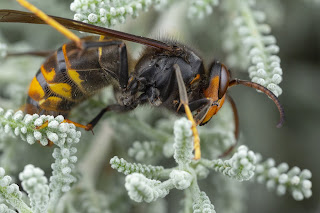Various articles and memes have been circulating social
media involving the Asian giant hornets (Vespa mandarinia), which have recently
come to be known as “murder hornets”. These articles report that the
Asian-based hornets have made their way to the United States, causing concern
across the nation.
The Asian giant hornet is the world’s largest at roughly two
inches long in length. It has a distinctive black tooth used for burrowing. Its
stinger is also very large at about a quarter inch in length. The concern regarding these hornets is
certainly warranted as they do pack a painful sting. Scientists are currently working
on locating these wasps and prevent their spread across the US.
The hornets have become infamous on the internet, but this
news was originally shared with the public to increase awareness. In the state
of Washington, where a couple of spotting’s of these hornets have occurred,
information regarding these citing’s was shared to ensure the public would keep
a look out for and report any possible nests. The reason we do not want the
Asian hornets in the U.S. is due largely in part because they eat and kill honeybees
and can be a threat to the honeybee population.
The good news is the Asian giant hornet, a
non-native species in the United States, is not found in Texas and the reality
of this being a concern for Texans is rare. In fact, mosquitoes, bees and
yellow jackets can be more of a concern when it comes to bites & stings. If
you are stung by a bee, wasp, or hornet, you can do the following.
- Remove the stinger by scraping across the skin with a credit card.
- Apply ice or cool water for 10 to 30 minutes after the sting.
If you think you have been stung by a bee, wasp, or hornet, contact
the Texas Poison Center Network at 1-800-222-1222 for treatment advice. If you are having an allergic
reaction that includes difficulty breathing dial 911. The poison center is available 24 hours a day,
7 days a week to help. For more information on the Asian giant hornet visit https://www.nationalgeographic.com/animals/2020/05/asian-giant-hornets-arrive-united-states/ and for more information on bites and stings visit the Texas Poison Center
Network’s website at www.poisoncontrol.org.

No comments:
Post a Comment